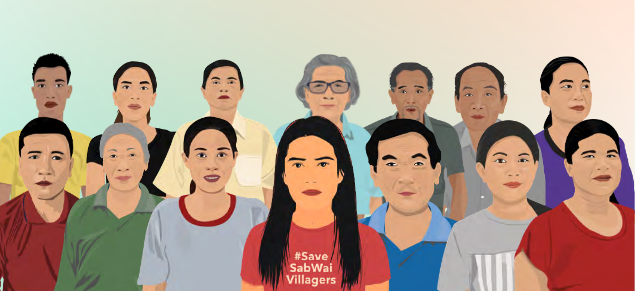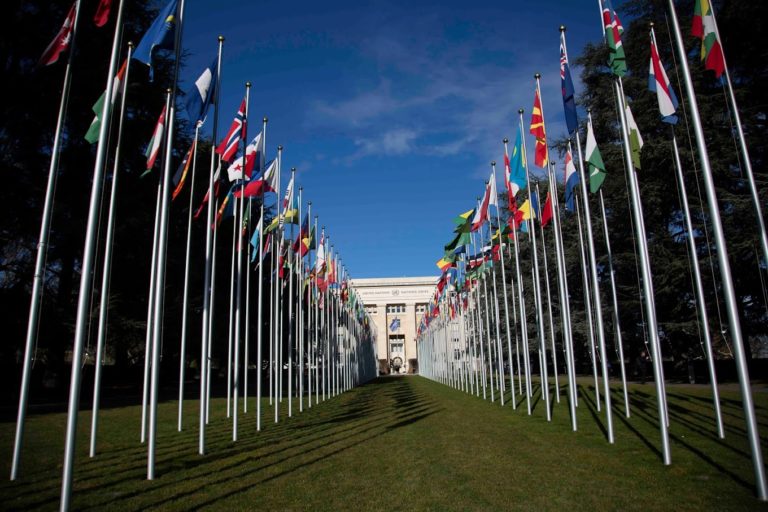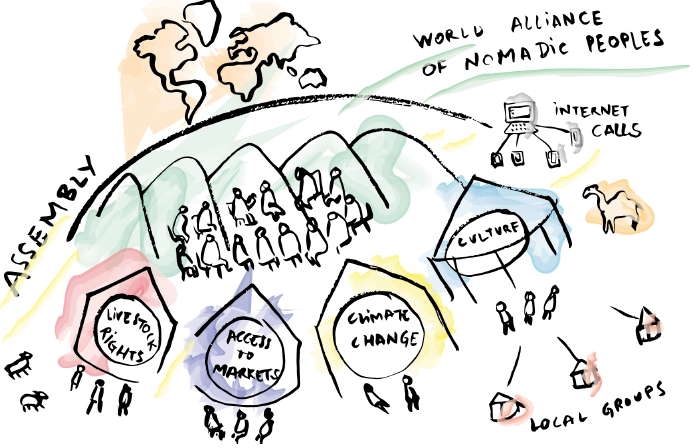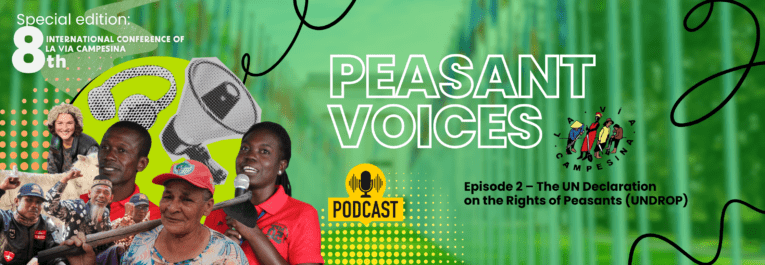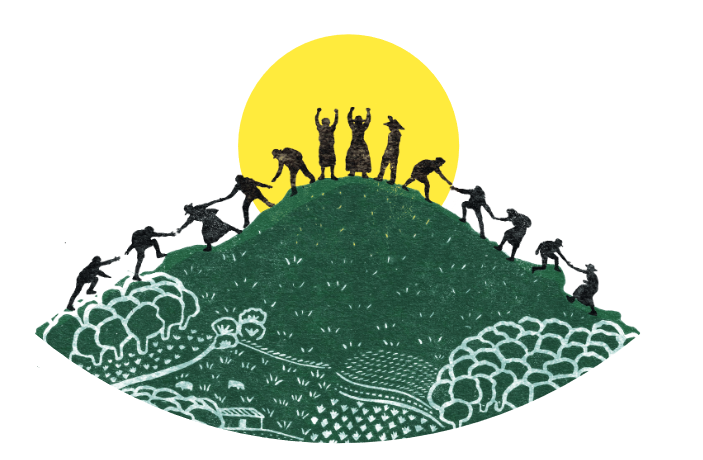In the name of climate: The criminalization of peasants and forest guardians in Thailand
In Thailand, the government has been rolling out a climate change mitigation policy since 2014. One of the components of this policy concerns the protection of the country’s forests. For this strand, the government has decided to sanctuary these lands in defiance of the lives and rights of the people who live and depend on them. Thousands of residents are accused of encroaching on the forests. 14 of them, in their fight against these abusive accusations and to stay on their land, have appealed to seven United Nations (UN) special rapporteurs on human rights. These independent experts and human rights specialists jointly called on Thailand to put an end to these accusations and expulsions, relying in part on the UNDROP.
Unjust criminalization
14 members of the Isan minority practicing family peasantry in the village of Sab Wai, Thailand, have been unjustly accused of destroying and “encroaching on the forests” even though they inhabited and lived off this land before the area became the protected Sai Thong National Park in 1992.
These accusations stem from an instrumentalization of the government’s 2014 climate change mitigation standards (Forest reclamation policy, NCPO Orders 64 and 66). These policies, adopted as part of Thailand’s participation in the World Bank’s Forest Carbon Partnership Facility, were supposed to prevent the misuse of forest land by big business. In practice, however, 10 million people – 2,700 forest communities – across Thailand are threatened with eviction from their land1. While these norms stipulated that “any operation must not have an impact on the poor people who have lived on these lands”, over 7,000 villagers are imprisoned every year on charges of “encroaching on forests” (and over 46,000 people have been arrested since the policy was implemented2).
“The Thai government instrumentalizes its commitment to the Paris Agreement and the need to reduce carbon emissions and criminalizes poor villagers, while indigenous peoples and forest-dependent communities actually contribute to forest protection through their traditional ways of life and culture.3”
Manushya Foundation, August 4, 2022
In 2018, the 14 Sab Wai villagers in question were ordered to pay fines, leave their land and destroy all their facilities. 11 of them were placed on probation and 3 others were sentenced to prison terms ranging from 5 months to 4 years. These sentences were confirmed by the Court of Appeal in 2019, and by the Supreme Court in 2021.
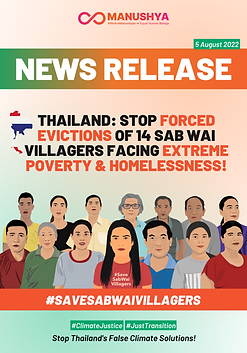
Recourse to UN special procedures
Faced with this situation, human rights organizations4 supported the Sab Wai villagers and turned with them to the special procedures of the UN Human Rights Council.
On June 23, 2019, they submitted their requests to seven special rapporteurs: on extreme poverty, on the right to food, on the right to adequate housing, on the right to a healthy environment, on freedom of opinion and expression, on freedom of peaceful assembly, and on human rights defenders. Special Rapporteurs are independent experts appointed by the Human Rights Council to report on the situation of human rights and advise on their implementation. To this end, they can issue thematic reports, carry out country visits, receive complaints and communicate with the States concerned.
The Special Rapporteurs who were contacted by the villagers asked the Thai government to explain their actions and their compatibility with international law. In their communication with the Thai government, they also warned that any evictions would violate the villagers’ human rights, in particular their rights to housing, food, water, health and work. The Special Rapporteurs underline that: “If the environment must be protected to guarantee the enjoyment of human rights, the environment itself depends on the exercise of human rights. It is therefore essential that conservation policies integrate these rights.5“
On June 10, 2020, a year after the rapporteurs’ referral, the Thai government partially answered their questions, evading in particular the frequent threats made by Sai Thong park officers towards the 14 villagers. As the situation did not improve for them, a second urgent complaint to the UN special procedures was sent in August 2022.
The special rapporteurs have once again turned to the Thai government. In their communication, they deplore the fact that eviction orders have been issued without offering alternative housing or farmland, or providing adequate compensation. They underline the contradiction (or hypocrisy) of the authorities, who criminalize communities dependent on forests and on subsistence and family farming under the pretext of combating climate change, while at the same time authorizing numerous investors to operate in protected areas and even withdrawing hectares from nature reserves to transform them into special economic zones.
The Special Rapporteurs also request precise information on this situation and, pending a response from the Thai authorities, demand that they take all necessary precautionary measures to put an end to the alleged violations and prevent their recurrence.
According to recent information from the Manushya Foundation, the threat of eviction has been lifted for a year while the authorities find a solution.
Welcome convening of the Declaration of the Rights of Peasants
In their most recent communication, the Special Rapporteurs express grave concern that the Thai government is failing to take into account the impact of its policies on the human rights of forest-dependent communities, in particular their right to an adequate standard of living, including adequate food and housing. This right is recognized in article 11 of the International Covenant on Economic, Social and Cultural Rights. It is also mentioned in several articles of the UN Declaration on the Rights of Peasants and Other Rural Workers (UNDROP), for example in articles 16 and 17.
The Special Rapporteurs drew on these international human rights instruments at the end of their communication to remind Thailand of its obligations. Indeed, Thailand has ratified the above-mentioned Covenant – which is a binding treaty – and voted in favor of the adoption of UNDROP at the United Nations General Assembly.
Two articles of the Declaration were invoked by the Rapporteurs in the case of the Sab Wai villagers:
Article 17.1 recognizes the right of peasants and workers in rural areas to land, water bodies, coastal and fishing zones, pastures and forests. They can use and “manage them in a sustainable manner, to ensure an adequate standard of living, to have a place to live in security, peace and dignity, and to develop their cultures“.
Article 18.3 states that: “States shall comply with their respective international obligations to combat climate change. Peasants and other people working in rural areas have the right to contribute to the design and implementation of national and local climate change adaptation and mitigation policies, including through the use of traditional knowledge and practices.“
The mention of these articles is welcome, as it testifies to the increasingly frequent use of this young declaration – adopted in 2018 – in the UN system (See C. Golay’s article). The use of the Declaration by the rapporteurs contributes in particular to raising awareness of this text, but above all to establishing its scope and pointing out to States the need for them to integrate these rights into their national policies and legislation. It also highlights the need for a special mechanism dedicated to the Declaration within the Human Rights Council.
The more the various UN bodies and farmers and others working in rural areas mobilize the Declaration, the more it will take root in the human rights landscape, becoming an essential instrument at all levels.
- https://en.wikipedia.org/wiki/Sai_Thong_National_Park#cite_note-SCMP-20200202-4 ↩︎
- https://www.mekongeye.com/2023/01/16/thailan-troubled-forest-policy/ ↩︎
- Petition to the United Nations for urgent measures to protect the 14 inhabitants of Sab Wai https://www.manushyafoundation.org/_files/ugd/a0db76_b0596c8c728849b2b163130b061f4548.pdf p.4 ↩︎
- Isaan Land Reform Network, Manushya Foundation, Focus on the Global South, iLAW, Protection International, Institute of Human Rights and Peace STudies Mahidol University, Rangsit University ↩︎
- Communication from the special rapporteurs to the Thai Government, AL THA 7/2019, August 19, 2019. ↩︎

